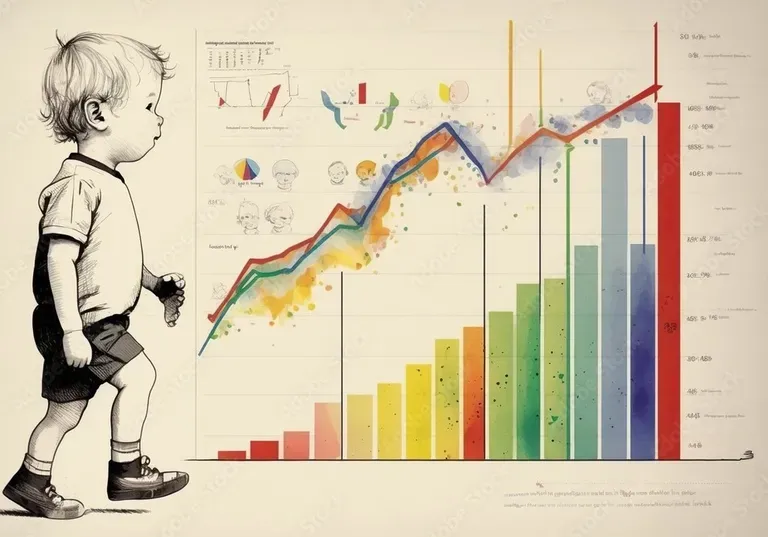Pediatric growth charts track kids’ growth to identify normal or abnormal patterns. Deviations may signal health issues for a pediatrician to check.
The growth chart displays the progress of height and weight increment and reveals whether the child is growing normally. Medical staff use pediatric growth charts during regular check-ups to compare how well children are developing compared to peers of same age and gender. With this, the physician can tell whether or not the child’s growth and development are normal for a healthy child or there is a medical complication concerning his development. Abnormalities from the usual growth curve can be considered as the first sign that additional investigation should be entertained.
What Information is on Pediatric Growth Charts
Pediatric growth charts picture indices for weight, height, head circumference (for infants) and body mass index (BMI) to depict a child’s growth. 36 months old and younger babies have their weight, length, and circumference of their heads counted and written down. Children and adolescents of varying ages from 2 to 20 years are also screened for their weight, height, and BMI. When comparing the measurements plotted against the percentile lines on the growth chart, physicians can picture where a child is located relative to the children of the same age and gender. This is important to check if progress is abnormal or if it is still healthy.
What the Percentiles on Growth Charts Represent
Percentiles show what percentage of your peers are below a specific measurement for your given age. For instance, a two-year-old girl in the 25th height percentile is taller than 25% of other 2-year-old girls and shorter than 75% of them. Being on the high or low end of the percentile may not be the sign of the problem itself. Another parameter that pediatricians examine is whether a child is growing according to his growth curve. So as long as the pattern keeps going, the ‘staying in the same percentile’ is considered normal. Nonetheless, a percentile switch or imbalance should be the cause for a more in-depth assessment.
Potential Warning Signs From Pediatric Growth Charts
While changes in growth do not automatically mean illness, a few patterns on growth charts may suggest an underlying condition. These include a change in the percentile a child has consistently followed, lack of expected gains in height or weight over time, or mismatched percentiles between measurements (e.g. being in the 90th percentile for weight but 10th for height). Head circumference that is significantly above or below average warrants attention in infants as well. In all cases, doctors consider genetic and family factors, general well-being, and the presence of symptoms when interpreting growth chart results.
Using Calculators And Online Pediatric Growth Chart Tools
In addition to printed growth charts, pediatricians may use online pediatric growth chart calculators and tools. Websites like CDC Growth Charts offer interactive growth chart plots and calculators to determine exact growth percentiles and track changes over time. This allows for close monitoring of a child’s measurements between office visits. Plotting onto digital growth charts enhances accuracy and interpretation when evaluating a growth pattern for potential problems. Together with physical exams and health history, pediatric growth charts and online tools empower doctors and families to closely track children’s growth development.
Ensure Your Child’s Healthy Growth and Development
As your child’s primary healthcare provider, Bread of Life Pediatrics can closely monitor your child’s growth patterns and flag any areas of concern through regular use of pediatric growth charts. Our knowledgeable pediatrician, Dr. Ijeoma Oguagha, understands the importance of tracking growth milestones from infancy through the teen years.
During your child’s wellness visits at our Houston practice, we will carefully plot their measurements on standardized growth charts to analyze weight, height and BMI gains over time. This screening helps us identify potential issues early on so your child gets the support and care they need.
In addition to growth chart oversight, our full scope of pediatric services covers well-child checks, acute illnesses, asthma/allergies and more. Our caring team is dedicated to partnering with you to promote your child’s overall health and development.
Schedule an appointment with Bread of Life Pediatrics today. Our specialized pediatric care will give you peace of mind knowing your child’s growth is on the right track to reach their full health potential. Contact us at 346-746-7420 or request an appointment online. We look forward to welcoming your family to our practice.


